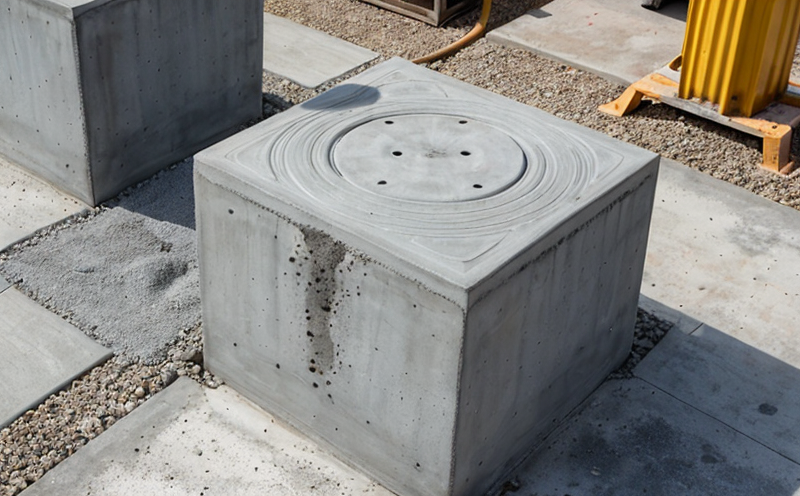ISO 679 – Determination of Mortar Compressive Strength
The ISO 679 standard provides a standardized method for determining the compressive strength of mortar, which is crucial in ensuring the quality and durability of concrete structures. This test is particularly important in sectors such as building & infrastructure testing where the integrity of materials plays a significant role in structural safety.
Mortar is composed of cement, fine aggregate (sand), water, and possibly additives like fly ash or superplasticizers. Its compressive strength indicates the material’s resistance to crushing under an applied load. Understanding this property helps in selecting appropriate mortars for different applications such as masonry, plastering, and surface coatings.
The test procedure outlined in ISO 679 involves casting specimens into standard cylindrical molds of dimensions 40mm x 160mm (diameter x height). After curing under specified conditions, the specimens are tested for compressive strength. The result is reported as the average value from a series of tests conducted on multiple specimens.
Accurate determination of mortar compressive strength ensures that construction materials meet the required quality standards and specifications. This is especially important in sectors like building & infrastructure testing where compliance with regulations is critical for public safety.
The process involves several key steps: sample preparation, curing conditions, mold casting, and finally, compression testing. Each step must be meticulously followed to ensure reliable results. For instance, the specimens should be cast under controlled environmental conditions to prevent any external factors from influencing their strength development.
Understanding the parameters involved in this test is essential for those working in quality management or compliance roles. The ability to interpret these parameters accurately can lead to better decision-making regarding material selection and project specifications. For R&D engineers, knowledge of ISO 679 can provide insights into optimizing mortar formulations.
Compliance officers will find this test particularly useful for ensuring that materials used in construction adhere to relevant standards and codes. By following the procedures outlined in ISO 679, they can verify compliance with international regulations which are crucial for project approval and certification.
| Standard | Description |
|---|---|
| ISO 679-1:2015 | Determination of compressive strength of mortar — Part 1: Using cylinders with a diameter of 40 mm and a height-to-diameter ratio of 3:1. |
The standard is widely recognized for its precision and consistency, making it a reliable tool for material testing in various industries. By adhering to this standard, laboratories can ensure that their test results are accurate and comparable with those from other reputable facilities.
Applied Standards
| Aspect | Description |
|---|---|
| Curing Conditions | The specimens are cured at a temperature of 20°C ± 3°C and relative humidity above 95% for 7 days. |
| Specimen Preparation | Mortar is mixed according to the specified proportions, cast into molds, and then left to cure under controlled conditions. |
The curing process plays a critical role in developing the compressive strength of the mortar. The temperature and humidity levels during this period significantly influence the final test results. Therefore, it is essential that these parameters are strictly adhered to as per ISO 679 guidelines.
Once cured, the specimens undergo compression testing using a hydraulic press capable of applying force uniformly across the specimen’s surface. The force applied until failure is measured and recorded. This process yields the compressive strength value which is then averaged over multiple tests for greater reliability.
The methodology described in ISO 679 ensures that all laboratories conducting this test follow a consistent procedure, leading to standardized results across different testing facilities worldwide. This standardization is vital for maintaining confidence and trust in the integrity of the construction materials used in various projects.
Eurolab Advantages
Eurolab offers a comprehensive range of services related to ISO 679 testing, providing clients with unparalleled expertise and precision. Our team of highly qualified professionals ensures that every test conducted adheres strictly to the latest ISO standards.
We utilize state-of-the-art equipment and facilities designed specifically for mortar compressive strength testing. This allows us to deliver accurate results consistently across all our tests. Our laboratories are equipped with advanced compression machines capable of applying precise loads, ensuring reliable force measurements during testing.
Our commitment to quality is reflected in the strict adherence to international standards like ISO 679-1:2015. By doing so, we ensure that all our test results are comparable and accepted globally. This consistency is crucial for clients operating across different regions or countries where compliance with local regulations is mandatory.
Our experienced staff members possess extensive knowledge in concrete & cement testing, enabling them to provide valuable insights into the performance of mortars under various conditions. This expertise extends beyond mere testing; it includes offering recommendations based on test results which can help clients improve their product quality or formulation processes.
Eurolab’s reputation for providing high-quality services is built on years of experience and dedication to excellence in every aspect of our operations. We pride ourselves on being a trusted partner for all your concrete & cement testing needs, especially when it comes to ISO 679 compliance.





